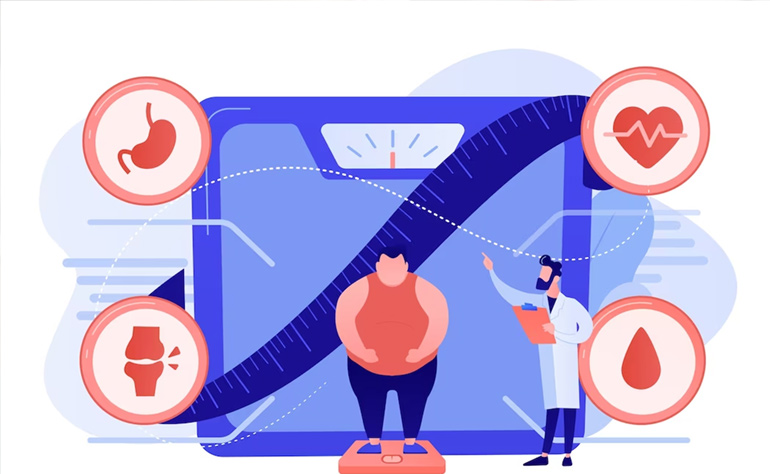What is obesity?
Obesity is traditionally defined as a body mass index (BMI) ≥ 30 kg/m2 in Western countries and > 25 kg/ m2 in Asian countries. It could also be defined as a body fat % of more than 25 in men and 30 in women. It is now known that abnormal body fat (adipose tissue) is responsible for the various metabolic abnormalities associated with obesity. Hence, the spectrum of diseases associated with increased body fat is called Adiposity Based Chronic Disease (ABCD). There is currently a move towards reducing the use of BMI to measure obesity to more accurate methods of looking at body fat, like body composition analysis with instruments.
How is obesity diagnosed?
Body Mass Index (BMI) is the simplest scientific calculation used to categorize an individual’s nutritional status based on height and weight. It is calculated as weight (in kg) divided by height (m) squared. There are cut-offs to decide if a person is overweight or obese. However, since people of different ethnicities have different risks for developing diseases at various BMI, the cut-offs are modified for the white and Asian populations. As you would realize, for Asians, the risk of obesity-related diseases starts at a lower BMI.
BMI Chart
Nutritional status based on the “WHO” and “Asian criteria.”
| Nutritional status | WHO criteria BMI cut off | Asian criteria BMI cut off |
|---|---|---|
| Underweight | <18.5 | <18.5 |
| Normal | 18.5 – 24.9 | 18.5 – 22.9 |
| Overweight | 25 – 29.9 | 23 – 27.5 |
| Obese | ≥ 30 | ≥ 27.5 |
Body composition methods like bioimpedance and DXA can be used to diagnose obesity by measuring body fat. In addition, these tests will measure the muscle mass and distribution of fat. In Providence, our weight management plans use bioimpedance analysis to follow body fat progress. Book your body fat analysis here.
What are the symptoms of obesity?

As the weight increases, there are various medical problems that the person can develop. Not everyone who is overweight will develop a medical problem at a particular weight or BMI. This includes a higher risk of diabetes, high blood pressure, and high cholesterol levels. This could lead to an increased risk of heart attacks or stroke. There is a higher risk of breathlessness due the increased weight, restriction of the lungs or obstructive sleep apnoea. People who are overweight may have an increased risk of varicose veins, leg oedema, gall bladder stones, fatty liver, and gastroesophageal reflux disease. There is an increased risk of breast, uterine, cervix, ovary, liver, kidney and prostate cancers. They can develop back pain and knee pain due to the mechanical aspects of being overweight. People with obesity can have an increased risk of anxiety and depression and face various forms of discrimination in the community and workplace.
Complications/health risks associated with obesity.
Obesity increases the risk of non-communicable diseases. Obesity is one of the major risk factors for developing cardiovascular disorders, especially coronary artery diseases and stroke, a leading cause of worldwide death. People with obesity are at risk of developing many other major diseases like diabetes mellitus, high blood pressure (hypertension), high LDL cholesterol, low HDL cholesterol or high levels of triglycerides. Non-Alcoholic Fatty Liver Diseases (NAFLD), and Obstructive Sleep Apnoea (OSA) are seen more in people who are obese. Obesity is also directly linked to metabolic syndrome, Polycystic Ovarian Disease (PCOD), gall bladder disease, osteoarthritis, reproductive disorders, skin problems, and cancers of the endometrium, breast, and colon. Obesity is closely associated with social stigma, low quality of life, depression, and anxiety. In short, obesity is associated with increased morbidity and all-cause mortality.
What are the causes of obesity?
Weight gain can be due to various reasons. Although it runs in families, purely genetic causes of obesity are quite rare. In families where obesity is common, it could be related to certain genetic changes related to metabolism and shared environmental risks like food intake, socioeconomic factors, and behaviours. Some hormonal diseases like hypothyroidism, hypogonadism and cortisol excess can lead to excess fat in the body. Energy excess due to an increase in intake of calories vs expenditure can lead to a gain in weight. This could be related to an excess intake of calories, especially those from junk food (high calorie, low nutrient value), reduced physical activity, sedentary lifestyles, high stress, and lack of sleep. Certain medications like antidepressants, antiepileptics, diabetes medicines and steroids can lead to weight gain. Certain eating behaviours, like impulsive eating, can be triggered by mental health issues like depression.
Stigma associated with obesity
Obesity stigma is characterized by prejudiced, stereotyped, and discriminatory views and actions towards people with obesity, often fuelled by inaccurate ideas about the causes of obesity.
Stigmatization of obese individuals poses serious risks to their psychological and physical health. Because weight-based stereotypes and prejudice so often emerge from attributions that obesity is caused and maintained by personal characteristics such as laziness, unsuccessful, unintelligence, lack of self-discipline, poor willpower, and noncompliance with weight-loss treatment. These stereotypes give way to stigma, prejudice, and discrimination against obese persons in multiple domains of living, including the workplace, health care facilities, educational institutions, the mass media, and even in close interpersonal relationships.
Finally, fear of stigma can lead to avoidance of seeking medical care, which creates barriers to obesity prevention and treatment strategies.
Diet in Obesity

A calorie imbalance in the face of adverse genetic and environmental backgrounds results in obesity. A calorie-deficit diet is recommended as the first line of treatment for obesity by most professionals. A restricted energy intake of around 500 calories from the individual’s daily intake has translated into a weight loss of ≥ 0.5 kg/ week. The proposed diet will be high in fiber and should supply adequate protein for fat loss rather than muscle loss. A very low-calorie diet(VLCD) is also prescribed for rapid weight loss by adding meal replacements. The replacements are concentrated formulas which provide calorie, protein, and other macro and micronutrients. The weight loss clinic at Providence has expertise in use of weight loss formulas and supervised diets.
Exercises in obesity

Exercise is important for overall health as well as for losing weight. It is recommended that people should engage in at least 150 – 300 minutes of moderate-intensity physical activity, such as brisk walking, double tennis etc., or 75 – 150 minutes of vigorous-intensity physical activity, such as jogging, running, single tennis etc., per week to prevent weight regain as well as to promote weight loss and thus improve fitness. One should also do muscle-strengthening activity at moderate or greater intensity on 2 or more days a week for additional health benefits. However, to lose weight, at least 200 – 300 minutes of moderate to vigorous physical activity per week is necessary for long-term weight loss. People should start with low-intensity physical activity and gradually increase the frequency, intensity and duration.
Behavioural interventions in obesity management
Behaviour modification is a structured method for improving lifestyle habits such as exercise, diet, and other practices that might influence obesity. Most behaviour modification strategies focus on increasing awareness around triggers for problem behaviours, identifying feelings and beliefs around weight issues, increasing structure around common weight-related behaviours, providing support that enables change, and setting realistic goals.
Effective behavioural strategies for weight loss are heavy on behaviour change techniques such as self-monitoring, physical activity, goal setting, problem-solving, support system, stressor and stimulus control, cognitive restructuring, alternative behaviours, continuous patient-centred care, weight control, and maintenance plan, structured meal plans, meal replacements, understanding portion control, and contingency management-making specific plans for “slip-ups” and alternative behaviours. These techniques can improve eating habits, thus aiding in weight loss.
What are the medicines for weight loss?

Medicines can help weight loss when used with a calorie deficit diet. Drugs like Orlistat help by reducing the absorption of fat. Certain medications like Qsymia (phentermine/topiramate) and Contrave (naltrexone/bupropion) act on various brain areas to reduce appetite. As of date, these two drugs are not available in India. GLP-1 receptor agonists are a group of medicines which act at various points of the gastrointestinal system and brain. These drugs produce 5-10 % weight loss. Two of these approved glucagon-like peptide-1 (GLP-1) agonists, including liraglutide (Saxenda) and Semaglutide (Wegovy). Various forms of these medicines are available for use in India. For rare causes of obesity due to genetic reasons, setmelanotide (Imcivree) is used.
The most effective drugs, like Liraglutide and Semaglutide, are safe and benefit the heart. They can cause gastric symptoms, which may wane over time. Our Weight Management Program at Providence uses these medicines in people for whom weight loss is difficult despite calorie restricted diet.
What are the surgeries available for obesity?

Surgeries done for weight loss are called bariatric surgeries. They are comparatively safe and low-risk surgery in the best of hands. They are currently advanced and use minimally invasive surgical techniques. Bariatric surgery is indicated in people who are obese with a BMI ≥35kg/m2) with other illnesses like diabetes, hypertension, sleep apnea, fatty liver disease or debilitating arthritis. In the absence of other diseases, it is indicated if BMI > 40.
Since many people with near-normal BMI but with increased body fat can have various manifestations like diabetes, abnormal lipid profiles, high blood pressure or fatty liver disease, procedures like bariatric surgery are done to improve their metabolic problems. This is called metabolic surgery.
There are various types of bariatric surgeries. This includes adjustable gastric banding, Laparoscopic Sleeve Gastrectomy (LSG), gastro-jejunal bypass (Roux-en-Y bypass) surgery, Biliopancreatic Diversion with Duodenal switch (BPD / DS), and Single Anastomosis Duodeno-Ileal Bypass with Sleeve Gastrectomy (SADI-S). The type of surgery is based on the medical conditions of the person with obesity. Ileal interposition or Duodenojejunal bypass are promising metabolic surgery options for an individual suffering from type 2 diabetes mellitus with a BMI as low as 30kg/m2 and obese.
Are there less invasive procedures for weight loss?
These are done in individuals who failed to achieve weight loss with diet and exercise, with BMI between 30 and 40. Not all obese individuals are the right choice. Individuals committed to healthy lifestyle changes, regular medical therapy, and willingness for behavioural therapy after a screening process are preferred. The procedure involves the insertion of a smooth silicon balloon into the stomach for up to 6 months and then removed endoscopically.
Liposuction is a cosmetic procedure that helps to reduce excess fat from specific areas for reshaping the body and is not an alternate option for weight loss surgery. This is not associated with metabolic benefits.
Why Providence?
Providence Endocrine and Diabetes Specialty Centre is one of the best and most highly rated centers for the management of diabetes and endocrinology in India. From the various options in weight loss treatment/ centers in Trivandrum, Providence marks its uniqueness through its well-experienced and dedicated team members, including doctors, dietitians, psychologists, and other staff, and a friendly patient-care atmosphere. The clinic is designed and updated with advanced techniques and equipment like a body fat analyser to guide the client in proper weight loss management. An individualized diet plan, supervision, and regular check-ups will keep you alert to achieve your goal. Experts’ opinions will be considered for further treatments like weight loss surgery. The weight management clinic has various packages for weight management which makes it a good option in obesity (weight loss) treatment in Trivandrum.
Comprehensive evaluation
This involves a detailed evaluation of the current and past medical history, focusing on weight history, cardinal reasons for weight gain, exhaustive exercise and diet history, and present complications associated with obesity. This is followed by investigations, including biochemical studies and body composition analysis. Following this, a consultation with endocrinologist, dietician and clinical psychologist is made. Providence offers the most scientific and comprehensive weight management evaluation in Trivandrum.
Plans of management: 12 WEEK PROGRAM
Providence offers various weight management programs to suit your convenience. These management plans will help weight loss. They are designed and implemented with inputs from international studies like DIRECT, Look AHEAD and Why Wait Program.
Management package: